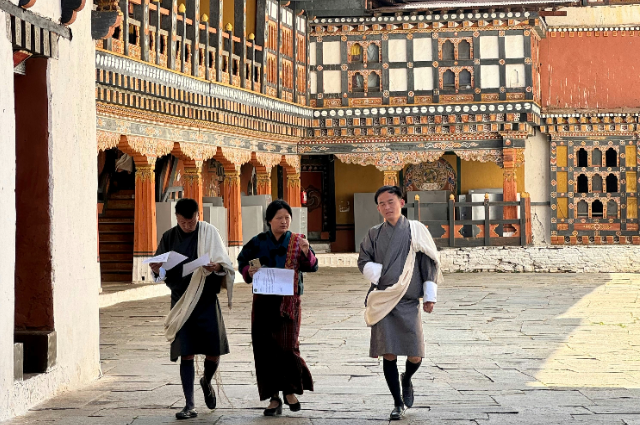
Photo by Despina Galani on Unsplash
While the world prepares for COP30 in Brazil, there’s something painfully repetitive about these global summits. The same powerhouses, USA, China, EU promise the same things in slightly different words. Developing countries like India, constantly stuck in the tension between growth and survival, try to hold their place at the table. Everyone talks about sustainability. But almost no one lives it.
And just beside us, almost quietly, sits Bhutan, a country that isn’t trying to be a trillion-dollar economy, doesn’t flex military power, and isn’t obsessed with high-rises or highways. Instead, Bhutan follows something most countries have long abandoned: intention. The kind that doesn’t just show up in speeches, but in how cities are built, how rivers are respected, and how people live their lives.
Bhutan's Wild Idea: What If Happiness Was the Goal?
Gross National Happiness (GNH) sounds like something a hippie might scribble on a protest sign. But in Bhutan, it’s serious. It’s a national policy. The entire system runs on four pillars: good governance, sustainable development, cultural preservation, and environmental conservation. GDP doesn’t define their progress. People do.
Now ask yourself what India would look like if we made peace, community, and nature a bigger priority than profit?
Because right now, India is chasing growth with so much speed that it's not asking what all this growth is costing us. Our rivers are dying. Our cities are choking. The air in Delhi in winter is basically poison. We worship gods of rivers, animals, and trees, but we pollute every one of them without blinking. So let’s be honest, we don’t actually respect nature. We just perform rituals around it.
Bhutan, on the other hand, doesn’t just say they care about nature; they’ve legislated it. Over 60% of the land has to remain forested by law. That’s not decorative environmentalism. That’s putting belief into structure.
Carbon-Negative and Not by Accident
Here's a fact that should shake up every industrial country at COP30: Bhutan has maintained the throne of being the only carbon-negative country in the world. Let that sit. While countries are trying to reduce emissions, Bhutan absorbs more carbon than it emits.
90% of its electricity comes from hydropower, clean and renewable. But it doesn’t stop there. Even their infrastructure is built with thoughtfulness. One hydroelectric dam inspired by India’s ancient stepwells features a temple right in the middle, gazing down into the valley. It's not just engineering. It's a philosophy in concrete. Instead of placing temples beside destruction (as we do), Bhutan blends the sacred into the functional.
That’s the kind of thinking we’ve lost.
Gelephu: Bhutan's Response to the Startup Craze
While India races to become a global startup hub, Bhutan is planning a different kind of innovation. It’s called the Gelephu Mindfulness City.
But don’t picture another glassy tech park. This is a city designed along river streams, connected by bridges, modeled on the Dzong architectural style. It’s not about competing with Silicon Valley. It’s about asking: Can a city help people slow down, reflect, and live better lives?
Even the international airport is being built in harmony with the river, not over it. No forceful reshaping of the land. No ego-driven megastructure. Just placement that respects what was already there.
In a way, Gelephu isn’t just a city, it’s Bhutan’s counterargument to the global obsession with speed.
A Country That Treats Rice Fields Like Wisdom
Bhutan’s climate is changing, just like everyone else’s. Floods are getting worse. But instead of pouring concrete everywhere, Bhutan is going back to the soil. They’re using paddy fields as sponges to absorb floodwater. It’s brilliant. Ancient. And simple. The kind of solution that respects the land instead of trying to conquer it.
Compare that to how India handles floods: drain them fast, build higher walls, then act surprised when it doesn’t work the next year. It’s like trying to fight fire with more fire. Bhutan’s method says: work with nature, not against it.
What India Can’t Afford to Ignore
India is not Bhutan. It's massive, chaotic, bursting with dreams and contradictions. But scale shouldn't be an excuse for bad choices.
Let’s not pretend we’re too big to think differently. Let’s stop blaming our problems on population alone. The real problem is intent. In public policy. In education. In the way we think about success.
Bhutan doesn’t have billion-dollar unicorns, but it has something India is slowly losing peace, clarity, and respect for the world that keeps us alive.
And here’s the sad irony: India has every reason to be the most environmentally respectful country. We’ve literally woven nature into our spirituality. But we treat our rivers like drains, our trees like obstacles, and our air like it’s not worth saving. Worship without respect is just noise.
Bhutan reminds us that policy can have a soul. That economy doesn’t need to come at the cost of sanity. That growth should feel good, not just look good on Paper
COP30 Will Happen. But Will We Listen?
In Brazil next month, there will be headlines, speeches, panels, and pledges. Everyone will talk about climate action. But here’s the thing, Bhutan doesn’t need to talk. It’s already doing it. It doesn't make noise. It builds quietly, lives slowly, and plans mindfully.
India will keep rising. But we need to ask: What are we rising towards? A trillion-dollar economy filled with unbreathable cities and unhappy people? Or something deeper, something that feels human again?
Bhutan may not have the loudest voice at COP30. But maybe it has the clearest one.
